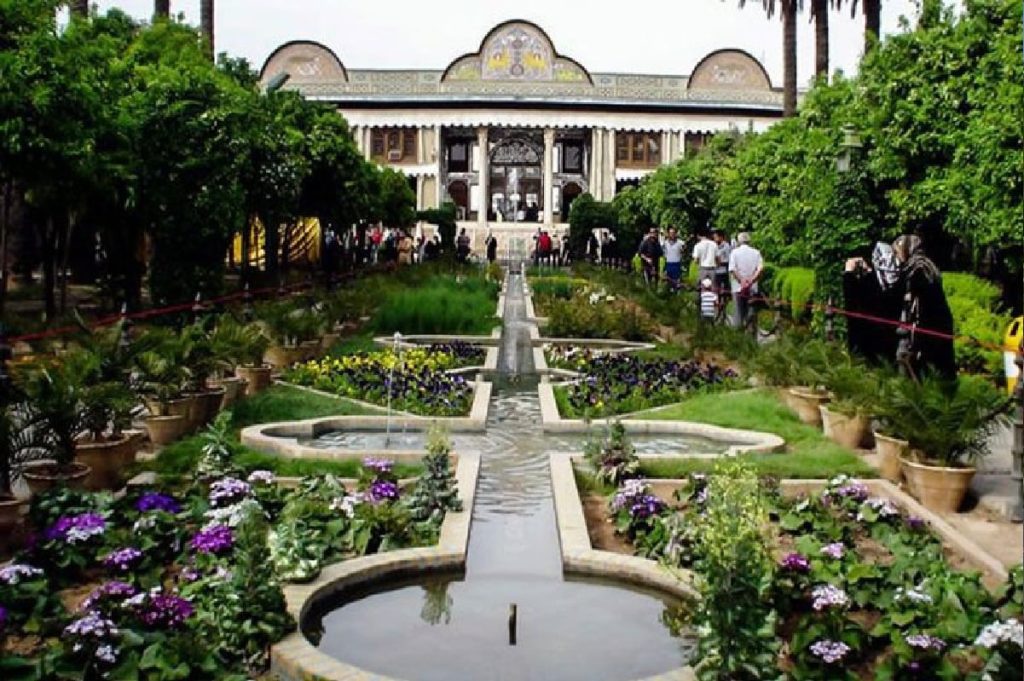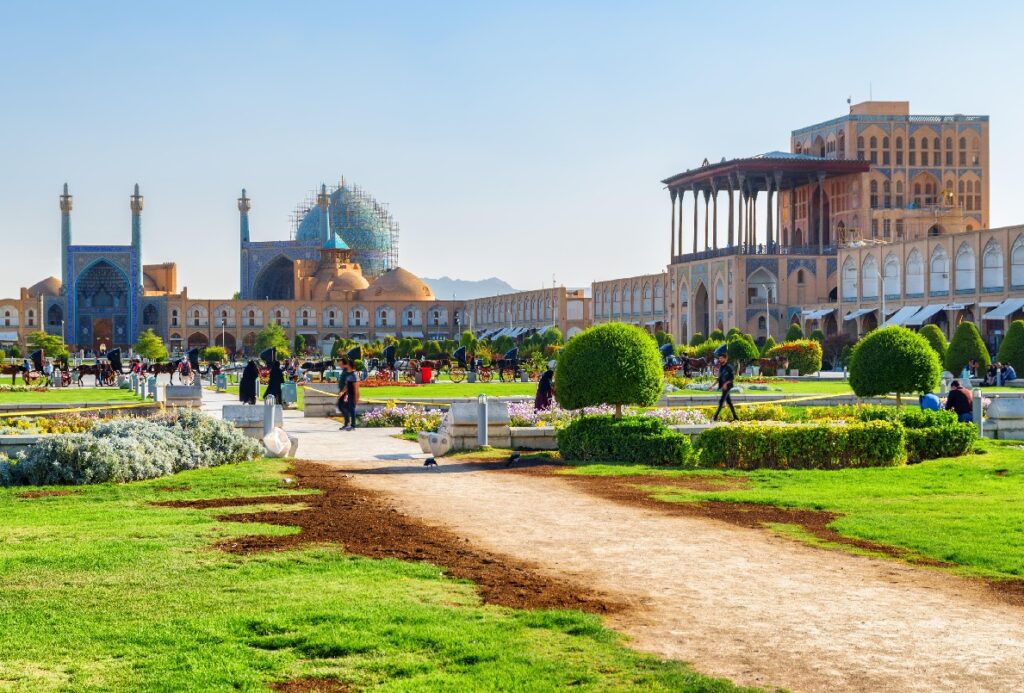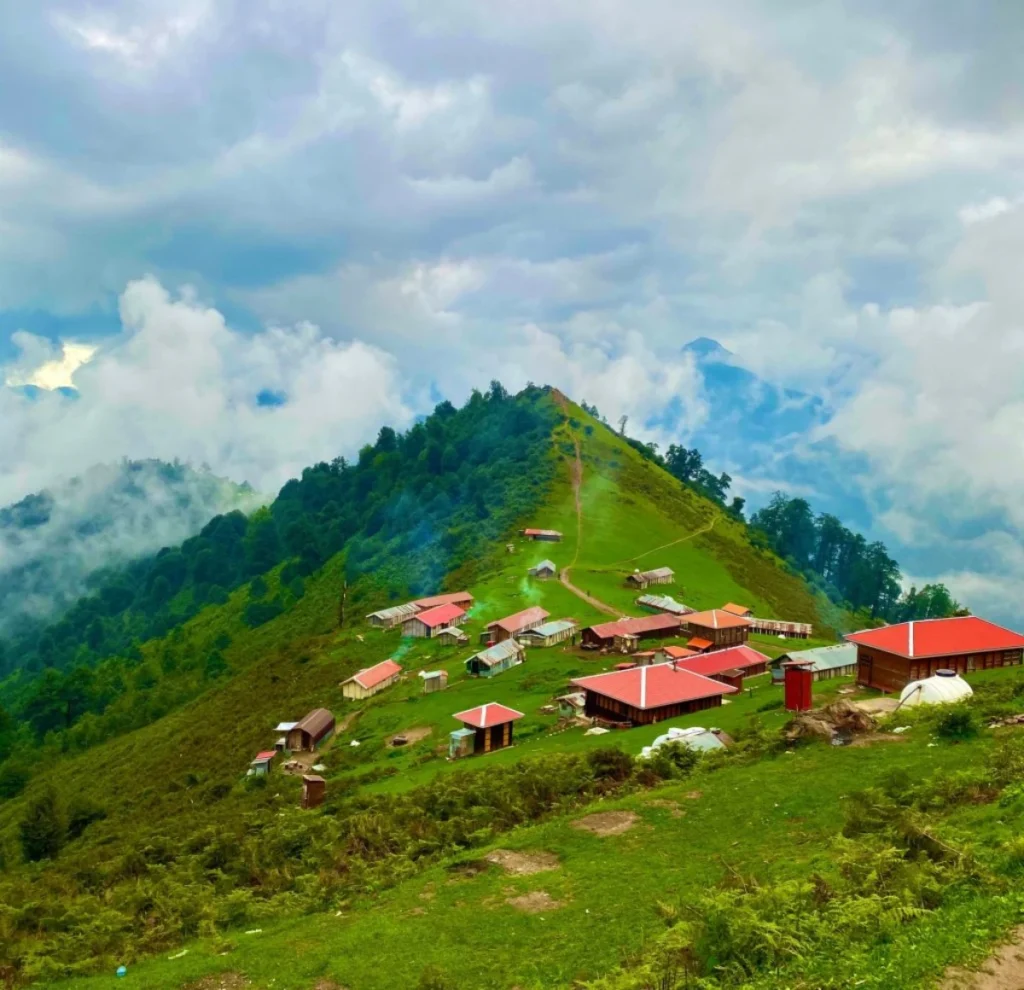Shiraz is a lovely city with a calm vibe and is home to the amazing Jahan Nama Garden. This famous landmark is sometimes referred to as the “Garden of the World.” This popular garden is a strong example of fantastic design mixed with the cultural legacy of Persian Gardens. It lets visitors enjoy lush greenery and remarkable water features, providing something similar to a heavenly atmosphere.
This ancient garden is a great place if you are looking for one of Iran’s breathtaking architectural sites as well as its rich history. Jahan Nama Garden is a must-see site in Shiraz’s cultural environment for anybody interested in history, the great outdoors or tranquility.
Jahan Nama Garden is a historic Persian garden located in Shiraz, Iran. It was built during the Safavid dynasty, which ruled Iran from 1501 to 1736. The garden was commissioned by Shah Abbas I and completed in the early 17th century and is known for its beautiful design and impressive architecture. The garden is a popular tourist destination and serves as a testament to Iran’s rich cultural heritage.
Introduction to Jahan Nama Garden
Jahan Nama Garden is one of the oldest and most famous gardens in Shiraz, covering around 5 hectares in the heart of the city. The garden’s bright flora, central octagonal pavilion, Chahar Bagh (four gardens) architecture and well-placed water channels all combine to create a peaceful setting that represents an earthly Eden.
Jahan Nama is a cultural treasure currently operated by Shiraz Broadcasting. It has been celebrated in Persian poetry by famous poets like Hafez and Saadi. Shiraz’s distinctive blend of nature, history and exquisite architecture attracts tourists from all over the world and offers a peaceful retreat in the center of the bustling city.

Historical Significance & UNESCO Recognition
The Jahan Nama Garden was constructed in the 13th century, dating back to the Al-Muzaffar and Al-Inju periods. It became well-known under Karim Khan Zand, who in the 18th century ordered the construction of its famous octagonal pavilion and put high brick walls around the garden, briefly renaming it “Bagh-e Vakil.”
Jahan Nama, which translates to “Garden of the World,” was the new name given to it during the Qajar dynasty, emphasizing its majesty and worldwide appeal. Historian Ibn Arabshah stated that the garden’s design was so significant that Timur of the Timurid Empire copied its pattern in Samarkand, referring to it as “Zinat al-Dunya”, or Ornament of the World in Persian.
Jahan Nama was included in UNESCO’s list of Persian Gardens as a World Heritage Site in 2011, along with 9 other Iranian gardens. This acknowledgment emphasizes how well it embodies the Chahar Bagh design, which symbolizes a paradise on earth by representing the Zoroastrian elements of earth, plants, sky and water.
Beyond Iran, the garden has influenced Spanish and Indian architectural traditions, such as the Alhambra and the Taj Mahal gardens. It is frequently portrayed as a poetic sanctuary in Persian literature, demonstrating its cultural resonance. It also remains a live reminder of Persia’s creative and horticultural heritage.
read also: about Naranjestan Qavam
Location & How to Get There
The beautiful Persian garden is situated perfectly in northeastern Shiraz, next to the Tomb of Hafez, close to Hafez Street and the historic Quran Gate. Because of its location in Fars Province, it is conveniently accessible to tourists as it is situated inside Shiraz’s historic center. The garden can be accessed in the following ways:
· By Car: You need to ride 500 meters or so along Hafez Street from Shiraz’s main entrance on Shiraz Street to get to the garden. You can also go straight to the entrance by taking Haft Tanan Boulevard to Naft Street.
· Public Transportation: The garden is a short stroll from Hafez Street or Quran Gate, which can be reached by riding local buses and taxis that go from central Shiraz.
· Walking: The garden is a lovely 5 to 10-minute walk from the Tomb of Hafez or Quran Gate, providing visitors with a picturesque look at Shiraz’s old center.
Jahan Nama is a great place to spend a day exploring Shiraz’s culture because of its close proximity to other sites like the Eram Garden and Haft Tanan Museum.
Explore affordable travel options with our Iran Budget Tours and discover the beauty of Iran
Architectural Highlights & Design
Jahan Nama Garden is an architectural gem of Persian garden design, skillfully combining water features, symmetry and luxury to create a serene and breathtaking setting. Its design and construction are the result of centuries of inventive horticulture, which have their roots in Persian customs that value balance between the natural world and human invention.
Persian Garden Layout (Chahar Bagh Style)
The garden is designed in accordance with the traditional Chahar Bagh (four gardens) layout, which has a quadrilateral shape with water channels and intersecting walkways dividing it into 4 symmetrical quadrants. This design, which dates back to the 6th century BC in Persia, represents the Quran’s depiction of heaven as well as the 4 Zoroastrian elements of sky, water, plants and earth.
An octagonal pavilion in the center of Jahan Nama’s grid-like pathways, which are bordered by cypress, rose trees and orange, creates a harmonious and beautiful scene. The garden is surrounded by high brick walls that add to its feeling of privacy and peace.
Persian engineering creativity is demonstrated by the design, which includes an advanced irrigation system that channels water from the Rokni River to maintain the garden’s beautiful foliage.
Pavilions, Water Features & Ancient Trees
The octagonal Kolah Farangi pavilion, which Karim Khan Zand had built in 1185 AH, is located in the center of Jahan Nama. Constructed on a 1.3-meter platform, it has elaborate stucco muqarnas decorating its high ceilings, a vast marble pool and four royal alcoves.
The pavilion was formerly used to receive dignitaries, and is now a museum that shows ancient manuscripts, pottery, paintings and coins, providing a window into Shiraz’s rich cultural past.
One of the garden’s water features is a lengthy rill that is fed by the Rokni River and has 64 fountains spread across eight sections of eight. The pavilion’s form and the eight cypress trees that line each road both include the number eight, which in Persian tradition is a symbol of wealth and prosperity.
Visitors are enthralled by the sensory-rich atmosphere created by the centuries-old cypress, citrus, pine and rose trees, some of which are millennia old.
Best Time to Visit Jahan Nama Garden
Spring (March to May) is the best time to visit Jahan Nama Garden, especially in May when the garden’s flora is in full bloom and Shiraz has pleasant temperatures of 15 to 25°C. The heavenly scent of orange blossoms and roses permeates the air and the cypress trees contrast sharply with the Zagros Mountains in the background.
The best season is autumn (September to November), when the garden is more charming due to the lower temperatures and vibrant foliage. Early morning trips are preferred because summer temperatures can exceed 35°C.
For a more sedate experience, winter (December to February) is the best time of the year because of the colder temperatures and fewer visitors. Every day from 8:30 a.m. until 8:30 p.m., the garden is open, giving visitors plenty of opportunity to appreciate its splendor throughout the year.
Things to Do & See in Jahan Nama Garden
There are many things to do while visiting this Persian garden. Here are some of them:
- Chahar Bagh Routes: Stroll down symmetrical avenues and enjoy seeing ancient trees and colorful flowers as well as peaceful water channels.
- Pavilion Museum: You can learn lots of stuff about rich Persian history by checking out ancient manuscripts, pottery, coins and paintings.
- Water Features: Foreign travelers can relax and enjoy the sight of the marble pool and the garden’s 64 fountains. It is a great chance for you to shoot stunning photos while listening and enjoying the sound of rushing water.
- Additional Attractions: You can get to enjoy other places, such as Eram Garden, Nasir al-Mulk Mosque and Hafez Tomb.
- Cultural Events: Visitors can enjoy listening to live musical performances and poetic readings to get more familiar with the amazing cultural and literary heritage of Shiraz.
Visitor Tips & Practical Information
Knowing these useful tips will reward a more enjoyable and comfortable Shirazi experience:
· Entry Fees: Just like with most places, there is an entry fee that may be different for foreign visitors. Verify current prices with the garden’s governing organization.
· Apparel: Put on some comfortable shoes to walk around the garden and dress modestly while respecting regional customs.
· Timing: The best time to visit is in the early mornings, while the weather is more pleasant.
· Dining: The Haft Khan restaurant and Black Burger Shiraz are two great places if you are looking for food, whether you are into delicious fast food or mouthwatering Iranian cuisine.
· Accommodation: Reserve a stay at one of the nearby hotels, like Persepolis Hotel and Shiraz Royal Hotel, to easily access the garden as well as other attractions in Shiraz.
· Respect the Site: Renovations have been done for the garden since 2004. So, please kindly abide by the regulations in restoration zones and do not pick the flowers or damage any plants.
























